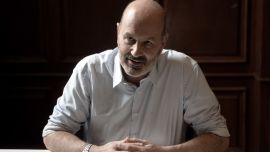Javier Milei abhors being associated with Nazism. Several years ago, when he was still an up-and-coming national deputy, the leader of the new-right La Libertad Avanza coalition gave an interview to one of TV’s eternal polemicists, Viviana Canosa. He lambasted “lefties,” but added some peculiar comments too – visibly excited, Milei told Canosa: “We are so much better than them [i.e. “the left”], we are crushing them in the culture wars, we are running them over.” And then came the kicker: “Not only are we beating them on the productive front, but we are also morally superior, aesthetically superior, we are better in everything and that’s what hurts them.”
Several journalists from across the ideological spectrum reacted by associating Milei’s statements with the Nazi concept of racial superiority. This sparked Milei’s ire, who accused the media of purposefully trying to misinterpret what he said and started legal cases against several of them. He sought reparations in the range of US$1 million, and ultimately extracted apologies from several of them. Milei is a profound admirer of Judaism and has the intention of converting, he argued in a response, while ideologically and methodologically there could be nothing farther from anarcho-capitalism than the corporatism of fascist Germany and Italy (maybe only socialist Communism). The architecture and philosophy of liberalism is superior to that of Communism, Milei would say.
Still, at that time, when it appeared highly unlikely that Milei would become the centre of Argentina’s political universe, several analysts and commentators sought to connect his style and rhetoric with the infamous movement led by Adolf Hitler. There was something about his level of aggression, particularly during debates on late-night cable TV. His look also had something about it too: a distinct hairstyle, generally dressed in black and the use of long leather trench coats. And as Milei got closer to power, so did the spectre of rising authoritarianism, particularly in the face of a distaste for the Republic, representative democracy, and the separation of powers, pushing instead for a dismantling of the institutions of government, particularly Congress.
The ‘N’ word issue is back at the centre of the discussion, particularly after the inauguration of Donald Trump as president of the United States. Not only has the “new right” begun to build a global network that could lead to some level of hegemony that could have an air of bellicose expansionism, but also because of Elon Musk’s controversial gesture — which he repeated twice. You know the one, the one that very much could have been a Nazi salute. Musk, a master “troll” who comments on almost everything online, didn’t reject the accusations outright. Rather he took the opportunity to continue trolling the digital airwaves, mocking the “mainstream media” and the left. Whether he did it on purpose or not didn’t seem to matter, it went viral anyway.
One of Musk’s staunchest defenders was Milei, who wrote a long post on social media platform X (formerly Twitter, renamed by Musk), titled: “My balls [he’s a] Nazi” (a rough translation from a colloquial Argentine expression). In his defence of the tech mogul, Milei noted that Musk is a staunch supporter of the ideals of freedom and a crusader against the ideas of “wokeism.” He capped it off with a threat: “We are not afraid of you, we will go after you to the farthest corners of the Earth in defence of the ideals of freedom. Tremble, lefty sons of bitches.”
Interestingly, Milei’s speech at the World Economic Forum in Davos this week showed a marked change from his debut lecture a year ago. The Argentine leader, the now consolidated global rockstar of the “new right,” switched from an anti-collectivist stance closely associated with the economic precepts of his libertarianism to full-on “culture war mode.” The decline of Western civilisation was tied to the “mental virus” of “wokeism,” he said, going on to enumerate specific examples of immigration and the LGBT agenda, which have apparently led to paedophilia and rape in Europe and the United States. While Milei mentioned some of the economic highlights of his administration as a model to replicate around the globe, his focus was on the culture wars, particularly tying himself to what felt like a Northern Hemisphere agenda. It’s not that he hasn’t espoused similarly vehement anti-woke views in the past, but the drastic change from the technical econometric lecture to an ideologically charged political speech was curious.
As he mentioned, Milei no longer feels alone, counting with the support of Trump and Musk in the US, Georgia Meloni in Italy, Nayib Bukele in El Salvador, Victor Orban in Hungary, and Benjamin Netanyahu in Israel. Indeed, Milei has morphed from an anti-political outsider economist to global political leader. But he also would’ve also been forced to contradict Trump if he went full anarcho-capitalist. Indeed, the US president has signed a series of executive orders instructing a clampdown of the border, the pursuit of drug-traffickers and cartels and the construction of a border wall, all of which feel contrary to anarcho-capitalism, while threatening the world with tariffs, particularly neighbours Canada, Mexico, and major competitor China. In order to align himself with the “Daddy” of the “new right,” Milei must appeal to the social agenda.
Is there a risk that the growing hegemony of the “new right” will unleash an era of increased belligerence and global war, much like the Nazi regime did in the 1930s? Trump’s re-election blows wind into the sails of the new right, which – in response to certain excesses of woke culture – is seeking to absolutely dismantle progressivism. Trump’s pursuit of territorial expansion, seeking to annex Greenland and recover the Panama Canal, could give free rein to other expansionist powers, namely Russia and China. Leaders like Trump, Bukele, and Milei have demonstrated disdain for liberal democracy, particularly its checks and balances, which could lead to greater authoritarianism. And they seek to silence critics, particularly the media, which they constantly attack. Yet, in Argentina it feels like a remake, not of the 1930s but of the Kirchner era and the early Menem administration. From an Argentine standpoint, Milei’s political style is reminiscent of the two latest hegemonic movements, which despite sharing political parties, were antagonistic ideologically.
At a global level, there does seem to be a growing climate of conflict, which Trump could exacerbate. He rejected that, noting in his inaugural speech “my proudest legacy will be that of peacemaker and unifier.” We’ll have to wait and see, but back in 1981 San Francisco punk band Dead Kennedys released a song titled ‘Nazi Punks F-ck Off.’ They were responding to a growing wave of neo-Nazism encroaching punk culture. They accused Ronald Reagan of having “fascist cravings” and imperial tendencies, while penning a song titled, ‘California Uber Alles,’ denouncing California’s then- governor Jerry Brown. History does come in waves, it seems.



















Comments